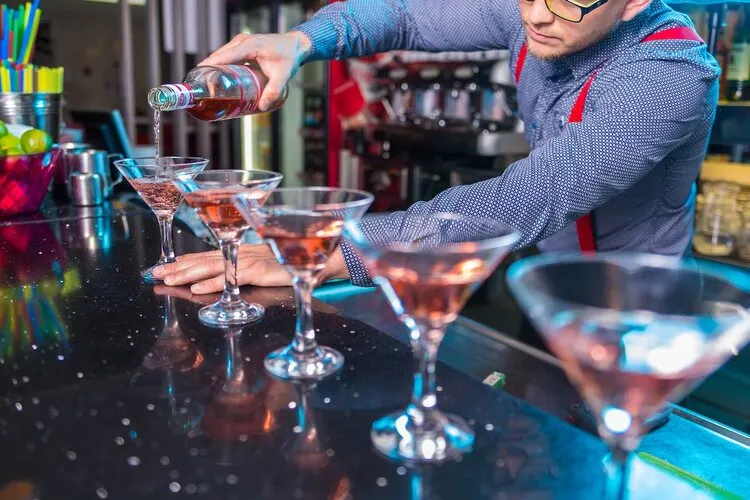
As a mobile bartender in the United States, you may need a liquor license depending on the types of alcohol you serve and your precise business location.
In most cases, you can bartend as long as you have received the necessary training, but when you start supplying alcohol, you would definitely need to acquire a license for your bartending business. Some bartending services offer full-scale services—including alcohol, signature drinks, glassware, and staff—while some will need the client to make available the alcohol and wine.
To run this business legally, it is necessary to research all the laws surrounding the sale of alcohol. Also, note that you might need to have a business location to successfully get a liquor license. In states where you need a location, you might also be expected to have a location permit just to have a separate catering alcohol permit which then gets inculcated as a supplemental.
However, you have to realize that all these vary by state. There are quite some simple states like Oregon, Washington, Vermont, Oklahoma, Kentucky, Connecticut, Maine, Massachusetts, which may be as facile as yearly paperwork.
Other states that might mandate a restaurant or retail location include Tennessee, California, Colorado, North Carolina, Maryland, Missouri, Montana, Arizona, Delaware, New Hampshire, Texas, Virginia, Ohio, Pennsylvania, Nevada, and New Jersey.
Some states will require a food catering company and commissary to work with the sale of alcohol like; Florida, Idaho, Illinois, Indiana, Michigan, Minnesota, Mississippi, Nebraska, New Mexico, West Virginia, Wisconsin, Louisiana, Georgia, and Hawaii.
There are also states that require only individual permits and they include New York, Rhode Island, South Carolina, and New Mexico. Additionally, some other states have no real permitting: Alabama, Wyoming, Iowa, Kansas, Alaska, Utah, South Dakota, North Dakota, and Arkansas.
How to Get a Liquor License as a Mobile Bartender
Have it in mind that liquor laws vary by state and are mostly imposed by local agencies; therefore it is very necessary to be well-informed before starting the process. To become a mobile bartender in the United States, you need to be very conversant with these requirements.
1. Know Your State’s Alcohol Laws
Just like it was stated above, liquor laws vary by state and each state has its own specific rules in terms of the distribution, sale, and consumption of alcohol.
Owing to that, the first step in obtaining a liquor license is to understand your state’s alcohol laws. Have it in mind that every state has its own Alcoholic Beverage Control (ABC) agency, which serves as the governing body that makes almost every rule concerning alcohol in the state.
In addition, a good number of counties and towns also have their standards and requirements that follow the more general state laws.
-
Find Out if You Live in a Liquor License Quota State
Although a good number of states offer an unlimited number of liquor licenses, some others tend to have specific quotas set for the number of licenses they can give out.
In the majority of states with quotas, the exact locality’s population is used to adjudge the number of licenses available. Therefore, as an area increases with more residents, the number of new licenses that can be issued also increases.
Have it in mind that these quota figures also tend to differ across states, therefore it is very necessary to contact your state’s ABC agency to know how strict the quota actually is, as this will definitely influence the cost and availability of a license.
-
Find Out if Your State Requires a Specific Class of Liquor License
You have to understand there is no one-size-fits-all liquor license in the United States, and some states may need even more specific licenses than others. To obtain your license, you must find out if you need an on-license or off-license.
If you will be selling alcohol to be consumed on the premises (i.e. Events, bars, nightclubs, and restaurants), then you will need an on-license. However, if you just supply to bottle shops, liquor stores, and other retail locations where alcohol is sold but will be consumed off the premises, then you should go for an off-license.
-
File a Liquor License Application
After you must have carried out your research on the liquor laws and regulations in your area, now is the time to apply for your liquor license. To apply, note that you will be expected to contact your state’s ABC agency and find the necessary paperwork.
Always remember that over-preparing for your liquor license application is impossible, therefore it is imperative to have everything you need ready before you start applying. In addition, your state may dictate that you must take training courses before your license will be issued.
In most places, you just have to visit your state government’s website, print the application form(s), fill them out, and then mail them in. Additionally, you may have to pay a non-refundable $50-$100 processing fee. Depending on the state you intend to run your business, you may even be subject to a background check and/or fingerprinting.
Conclusion
Mobile bartending companies are known to make money from the services they provide. Some customers will only need bartenders, while some will require full-scale service—drinks, glassware, mixers, etc. However, right before you start planning your killer shots, you are expected to comply with some regulations.
Also remember that laws vary by state and are determined by local agencies, so it is very necessary to be conversant with the process before you start your license application.
